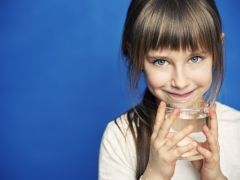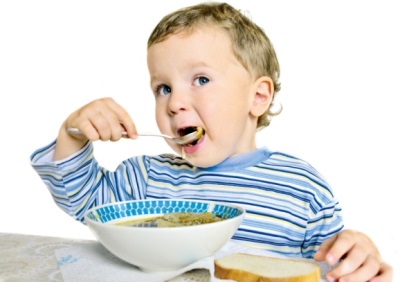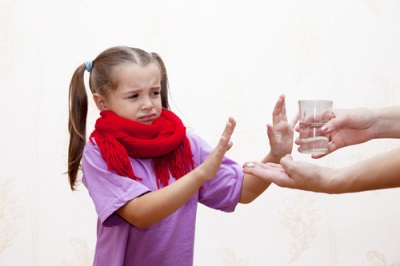What if the child does not drink water?
A person needs water to quench their thirst, good digestion and metabolic processes. The need for feeding babies is controversial, but in some situations, doctors unanimously advise giving a child simple water. When it is important for babies to get it in addition, what should the mother do if the crumb drinks little and what are the consequences of not giving the child water, if she needs it?
Whether to give baby?
In most cases, an infant up to 6 months old, receiving mother's milk, does not need to be supplemented with water.. The reason is that mother's milk serves for the baby in the first 4 months of life, not only food, but also a source of water.
If newborn will receive additional water, it can worsen lactation, and even cause breast failure.
However, if a healthy infant normally needs to receive it only with the beginning of the introduction of complementary foods from 6-7 months, then with artificial feeding water is necessary for babies from birth, as the milk formula loads the children's intestines.
In addition, in a situation where the mother’s milk is not enough and the baby is transferred to the mixture, at the same time they begin to give water.
In some cases, it is necessary to give the baby under 4-5 months, even if the crumb gets mother's milk. Such situations include frequent regurgitation, intestinal infections with rapid stool or vomiting, and other infectious diseases with fever. Also, the baby may need it in addition if it is in a condition of heat for a long time.
In any of these situations, the child must receive additional fluid to prevent dehydration. All pediatricians, including the popular doctor Komarovsky, insist on this:
How much does a child need?
A child’s water needs are influenced by various factors, among which are age norms, weather conditions, dry air in the room, consumption of fatty foods, and others. A 1-2-month-old baby, whether artificial or mixed, needs 100-200 ml of water per day in addition to the liquid in the mixture. One portion for such a baby is up to 30-40 ml.
Children older than two months volume calculated based on their weight. - for every kilogram you need 100 ml of liquid. For example, a child of 8 months with a weight of 9 kg should receive about 900 ml of water per day. A child aged 1-3 years should receive about 1300-1500 ml of liquid in the composition of drinks and liquid foods, for example, soup.
What to do when a child refuses to drink
Since water is needed by a child’s body every day, failure to drink can be dangerous, causing dehydration. The child is especially important to drink at elevated body temperature, intense sweating, her loss with vomit and liquid stools.
If in such situations not to pay attention to abundant drinking, it will only worsen the child's condition and may even end in death.
If there is a risk of dehydration, the child is given any drinks, so that the liquid must be in the children's body. The most suitable drink for intestinal infections is called rehydration solutions, which include salts that the child’s body loses with water.
But what should parents do if there is no danger to health, and the crumb just does not like ordinary water? Here are some tips for overcoming child rejection:
- If a child usually eagerly drinks water, but suddenly refuses it, no need to insist. Most likely, the crumb just drink later.
- When playing with a baby, put a mug or bottle next to it.. It can be easier for a child to get drunk on playing.
- Be sure to take her with you on walks, because on the street during outdoor games, many babies are very thirsty and they don’t refuse it.
- Offer a daughter or son to drink it from a glass through beautiful tubesFor example, changing color or with fancy bends.
- Experiment with the temperature. Some children do not like warm water, and someone refuses to cold.
- Also note that it can be different. If the baby refuses water from one manufacturer, offer a different brand.
- Tell children about 3 years old about its benefits and effects on the human body.. Let the child know that its use is important for strengthening the body and maintaining health.
- Show the child the importance of using your example. Drink together to form healthy habits for the whole family.
Child refuses to drink
The best drinking option for a child of the first years of life is considered to be ordinary water,More preferably in bottled form, produced specifically for children, but kids can also be given it in boiled form. It is not recommended to hurry with the acquaintance of a child with compotes and juices, as some kids, after having tasted sugary drinks, refuse simple water.
The situation when a child drinks only compote or juice is undesirable because of the harmful effects of sugars from such drinks on children's teeth. The very frequent consumption of sweet drinks provokes the development of caries (such damage to the teeth is even called bottle caries) and impairs digestion.
If the child has already tasted juices and compotes, doctors recommend diluting them with water, gradually reducing the concentration of the sweet drink. You can also buy a bright mug with the baby, from which you can only drink it. With a child older than three years, try to agree to drink compote or juice while eating, and between meals, use only plain water.
See more about the benefits in the program "Living Healthy".































































